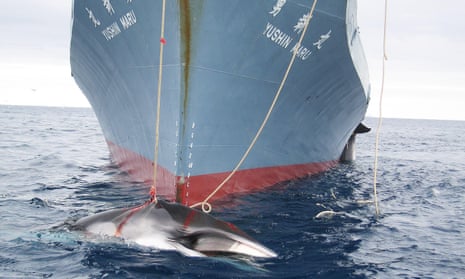Japan says it plans to resume whale hunts in the Antarctic later in 2015 even though the International Whaling Commission says Tokyo has not proven the mammals need to be killed for research.
The IWC’s scientific committee said in a report on Friday it was not able to determine whether lethal sampling was necessary for whale stock management and conservation. In April an IWC experts’ panel made similar comments about a revised Japanese Antarctic whaling plan submitted after the international court of justice ruled in 2014 that Japan’s hunts were not truly scientific.
The IWC banned commercial whaling in 1986 but Japan continued killing whales under an exemption for research. After the ICJ’s ruling Japan sent a non-lethal expedition to the Antarctic for the 2014 season.
Japanese officials said on Friday they will submit additional data to support their argument. They said Japan still plans to resume whaling in the Antarctic this winter season.
“We have not changed any policies and our goal,” Joji Morishita, Japan’s representative to the IWC, told reporters. He said Japan would respond sincerely to “scientifically backed comments” in the report but criticised it as lacking consensus.
Reflecting the sharp divide among the nearly 90 member nations of the international body, the report laid out both sides of the argument.
Under Tokyo’s revised proposal for the upcoming whaling season it plans to catch 333 minke whales each year between 2015 and 2027, about one-third of what it has previously targeted.
Japan’s actual catch has fallen in recent years in part because of declining domestic demand for whale meat. Protests by the anti-whaling group Sea Shepherd also contributed to the lower catch.
The Japanese government has spent large amounts of tax money to sustain whaling operations.

Comments (…)
Sign in or create your Guardian account to join the discussion